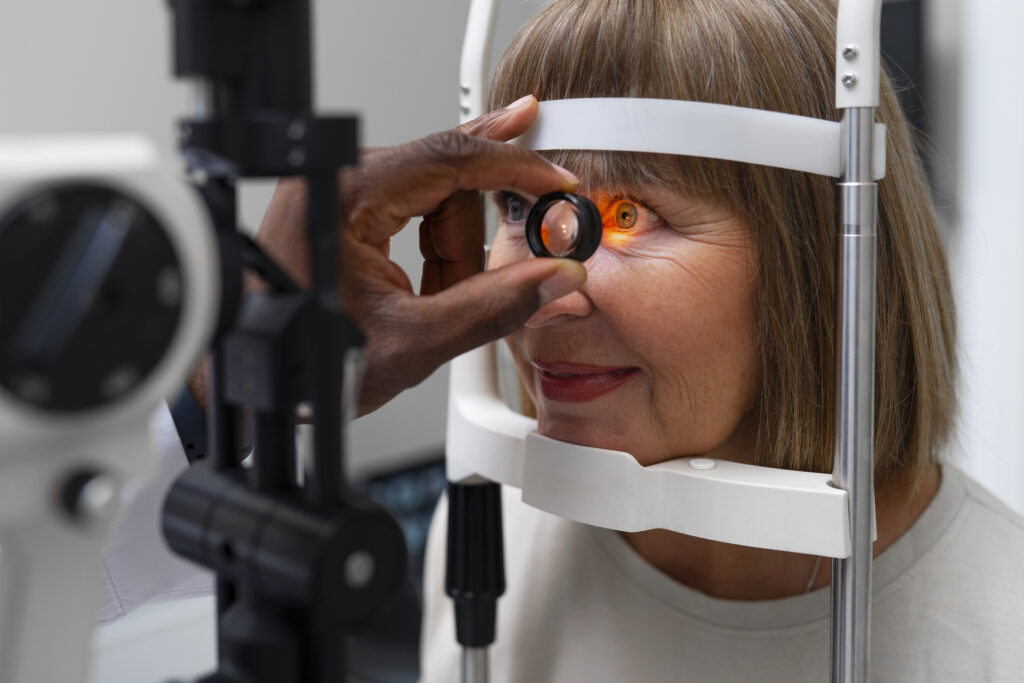Have you ever thought about how much your eyes reveal about your health? Your retina, the delicate layer of tissue at the back of your eye, is like a window into your overall well-being. A comprehensive eye exam doesn’t just help you see more clearly, it can detect early signs of serious conditions, sometimes before you even notice symptoms.
Why Is Your Retina So Important?
Your retina is responsible for turning light into signals that your brain interprets as images. Any damage to this vital structure can lead to permanent vision loss. Many retinal conditions are treatable when caught early. At Pendleton Eye Center our Retina Specialist, Dr. Nathan Rudometkin is experts in diagnosing and treating retinal conditions.

What Can an Eye Exam Reveal About Your Retina?
Eye exams go beyond checking your prescription—they can uncover hidden health concerns. Here are some conditions your doctor may detect:
Retinal Detachment or Tears
Ever noticed sudden flashes of light or new floaters in your vision? These could be early warning signs of a retinal tear or detachment. When the retina pulls away from the back of the eye, it can cause permanent vision loss if not treated immediately. Early detection can prevent severe complications.
Diabetic Retinopathy
If you have diabetes, your eyes are at risk. High blood sugar can damage the tiny blood vessels in your retina, leading to blurred vision, bleeding, or even blindness. Routine eye exams can catch these changes early, helping you take steps to protect your vision.
Age-Related Macular Degeneration (AMD)
Your macula — the central part of the retina is responsible for sharp, detailed vision. AMD can cause blurry or distorted central vision, making activities like reading and recognizing faces difficult. An eye exam can identify early signs like drusen (yellow deposits) and bleeding in the macula, allowing for timely intervention.
Retinal Vascular Occlusions
Think of the retina as a city powered by a network of tiny blood vessels. If a blockage occurs, blood flow is restricted, leading to sudden vision loss. During an exam, your doctor can detect swelling or hemorrhages in the retina, signaling a vascular issue.
Hypertensive Retinopathy
High blood pressure doesn’t just harm your heart—it can also damage your retina’s blood vessels. Hypertensive retinopathy may not cause immediate symptoms, but an eye exam can reveal narrowing or leaking blood vessels, prompting you to take control of your blood pressure before vision loss occurs.
Retinitis Pigmentosa
This inherited disorder affects peripheral and night vision, often leading to gradual blindness. An eye exam can detect pigment changes and narrowed retinal vessels, helping to diagnose the condition early.
Macular Hole or Epiretinal Membrane
Distorted or blurry central vision could be due to a macular hole or an epiretinal membrane. These conditions create a wrinkled or stretched appearance in the retina, affecting your ability to see fine details. Detecting them early can improve treatment outcomes.
How Do Eye Doctors Examine the Retina?
At Pendleton Eye Center, we use state-of-the-art technology to get a clear picture of your retinal health:
- Dilated Eye Exam – Special drops enlarge your pupils, giving your doctor a detailed view of the retina and optic nerve.
- OCT (Optical Coherence Tomography) – This advanced imaging test captures cross-sectional images of your retina, detecting swelling, fluid buildup, or thinning.
- Retinal Photography – High-resolution images document your retina’s condition, making it easier to track changes over time.
- Fluorescein Angiography – A special dye highlights blood flow in the retina, helping diagnose blockages or abnormal vessel growth.
- Ultrasound – If internal bleeding or cloudiness obscures the view, ultrasound imaging provides a clear picture of the retina.
What is the importance of early detection?
Many retinal diseases develop silently, showing no obvious symptoms until significant damage has occurred. Comprehensive eye exams allow doctors to catch these conditions early before they lead to irreversible vision loss. If you have risk factors like diabetes, high blood pressure, or a family history of eye disease, routine check-ups are even more crucial.
Your vision is priceless, and protecting it starts with a simple step—getting an eye exam. At Pendleton Eye Center, we’re here to help you safeguard your sight with comprehensive retinal evaluations. Don’t wait for symptoms to appear, take control of your eye health today.
Call us at (760) 758-2008 to schedule your appointment. Clear vision starts with early detection. Let’s keep your eyes healthy together!






